Analysis of Identity and Narrative in Tim Winton's Big World Extract
VerifiedAdded on 2022/09/15
|7
|2108
|18
Homework Assignment
AI Summary
This assignment analyzes an extract from Tim Winton's 'Big World,' focusing on the protagonist's struggle for identity and self-discovery. The analysis examines the character's dreams of escaping his current life, his relationship with his friend Biggie, and the impact of their shared experiences. It explores the use of colloquial language to convey the character's thoughts and feelings, and the narrative techniques employed by Winton to reflect the theme of finding one's identity. The assignment also identifies and evaluates effective imagery used to establish mood and connect the reader to the character's imaginary world. The narrative voice is examined for its effectiveness in engaging the reader and reflecting the challenges faced by the central character in making decisions and pursuing his desires. The analysis covers the setting's role in establishing the mood and the overall effectiveness of the narrative.
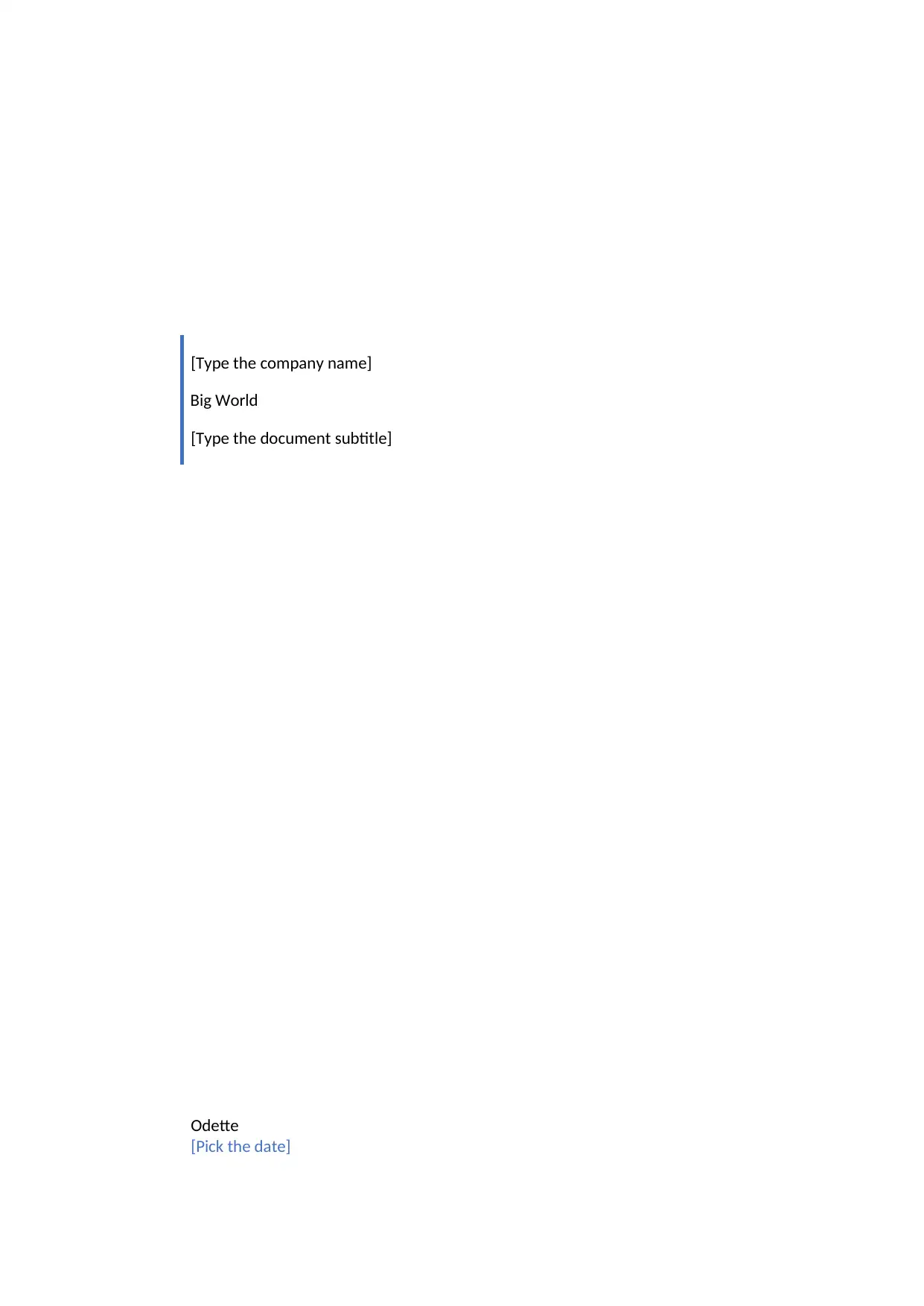
[Type the company name]
Big World
[Type the document subtitle]
Odette
[Pick the date]
Big World
[Type the document subtitle]
Odette
[Pick the date]
Paraphrase This Document
Need a fresh take? Get an instant paraphrase of this document with our AI Paraphraser
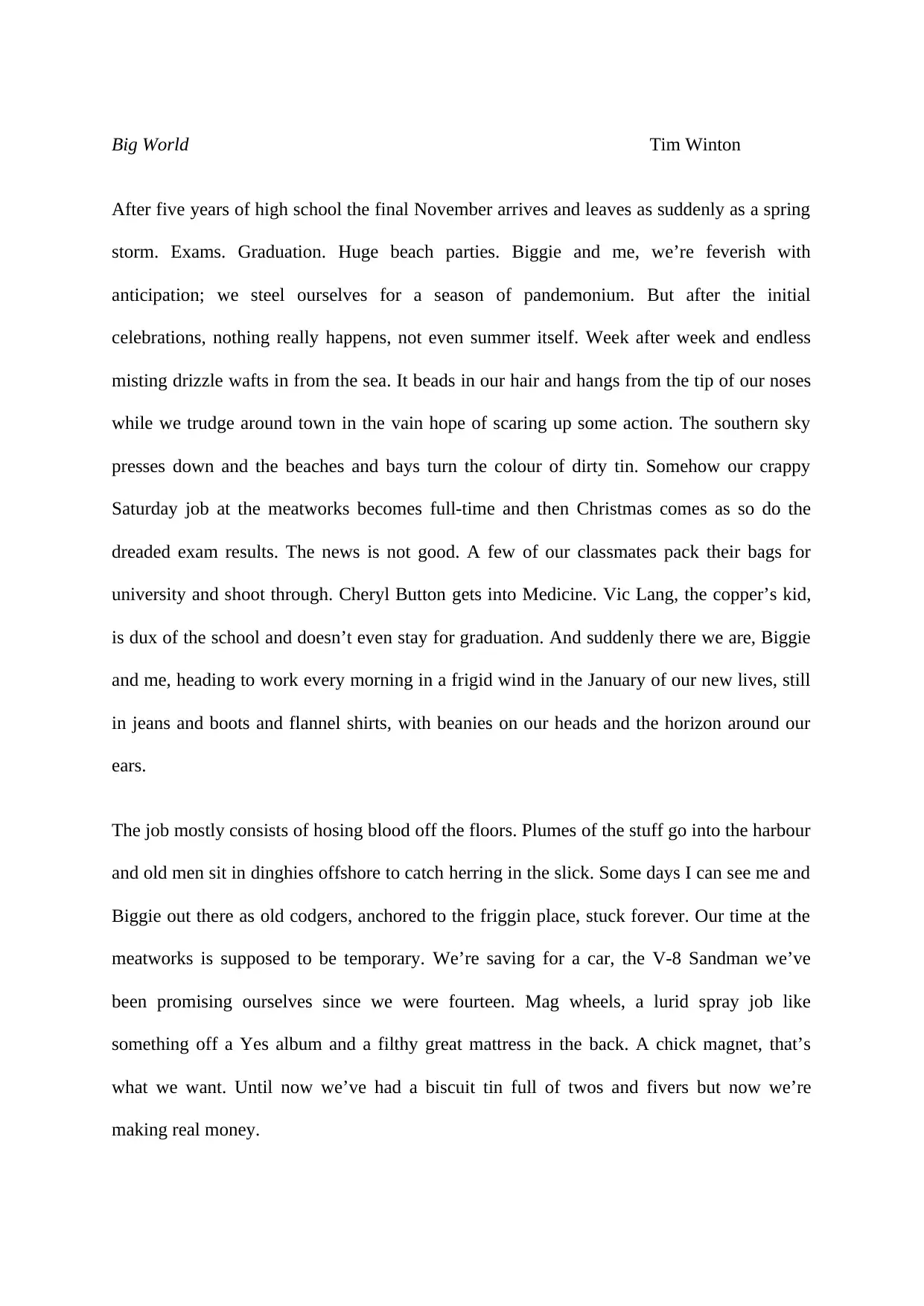
Big World Tim Winton
After five years of high school the final November arrives and leaves as suddenly as a spring
storm. Exams. Graduation. Huge beach parties. Biggie and me, we’re feverish with
anticipation; we steel ourselves for a season of pandemonium. But after the initial
celebrations, nothing really happens, not even summer itself. Week after week and endless
misting drizzle wafts in from the sea. It beads in our hair and hangs from the tip of our noses
while we trudge around town in the vain hope of scaring up some action. The southern sky
presses down and the beaches and bays turn the colour of dirty tin. Somehow our crappy
Saturday job at the meatworks becomes full-time and then Christmas comes as so do the
dreaded exam results. The news is not good. A few of our classmates pack their bags for
university and shoot through. Cheryl Button gets into Medicine. Vic Lang, the copper’s kid,
is dux of the school and doesn’t even stay for graduation. And suddenly there we are, Biggie
and me, heading to work every morning in a frigid wind in the January of our new lives, still
in jeans and boots and flannel shirts, with beanies on our heads and the horizon around our
ears.
The job mostly consists of hosing blood off the floors. Plumes of the stuff go into the harbour
and old men sit in dinghies offshore to catch herring in the slick. Some days I can see me and
Biggie out there as old codgers, anchored to the friggin place, stuck forever. Our time at the
meatworks is supposed to be temporary. We’re saving for a car, the V-8 Sandman we’ve
been promising ourselves since we were fourteen. Mag wheels, a lurid spray job like
something off a Yes album and a filthy great mattress in the back. A chick magnet, that’s
what we want. Until now we’ve had a biscuit tin full of twos and fivers but now we’re
making real money.
After five years of high school the final November arrives and leaves as suddenly as a spring
storm. Exams. Graduation. Huge beach parties. Biggie and me, we’re feverish with
anticipation; we steel ourselves for a season of pandemonium. But after the initial
celebrations, nothing really happens, not even summer itself. Week after week and endless
misting drizzle wafts in from the sea. It beads in our hair and hangs from the tip of our noses
while we trudge around town in the vain hope of scaring up some action. The southern sky
presses down and the beaches and bays turn the colour of dirty tin. Somehow our crappy
Saturday job at the meatworks becomes full-time and then Christmas comes as so do the
dreaded exam results. The news is not good. A few of our classmates pack their bags for
university and shoot through. Cheryl Button gets into Medicine. Vic Lang, the copper’s kid,
is dux of the school and doesn’t even stay for graduation. And suddenly there we are, Biggie
and me, heading to work every morning in a frigid wind in the January of our new lives, still
in jeans and boots and flannel shirts, with beanies on our heads and the horizon around our
ears.
The job mostly consists of hosing blood off the floors. Plumes of the stuff go into the harbour
and old men sit in dinghies offshore to catch herring in the slick. Some days I can see me and
Biggie out there as old codgers, anchored to the friggin place, stuck forever. Our time at the
meatworks is supposed to be temporary. We’re saving for a car, the V-8 Sandman we’ve
been promising ourselves since we were fourteen. Mag wheels, a lurid spray job like
something off a Yes album and a filthy great mattress in the back. A chick magnet, that’s
what we want. Until now we’ve had a biscuit tin full of twos and fivers but now we’re
making real money.
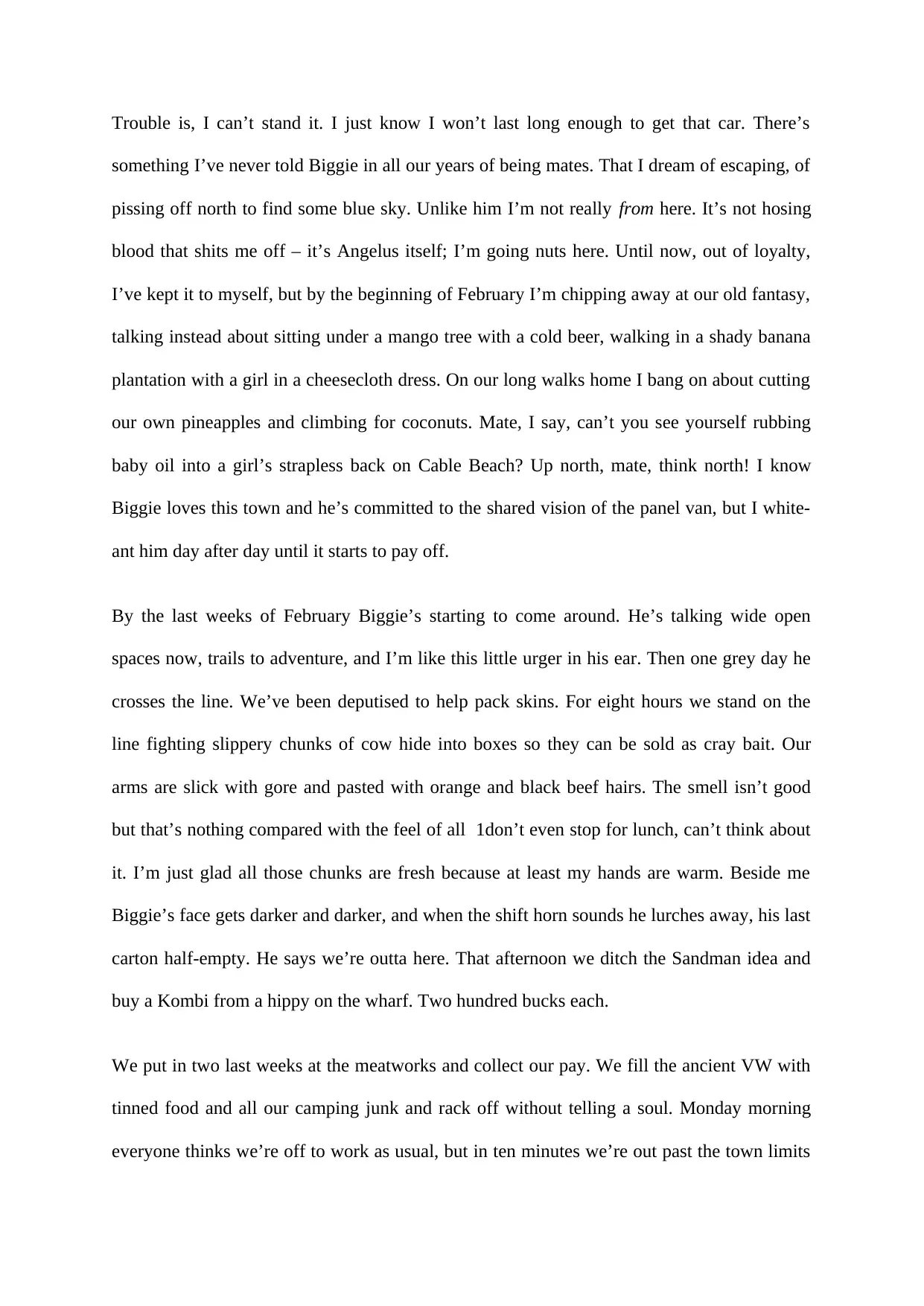
Trouble is, I can’t stand it. I just know I won’t last long enough to get that car. There’s
something I’ve never told Biggie in all our years of being mates. That I dream of escaping, of
pissing off north to find some blue sky. Unlike him I’m not really from here. It’s not hosing
blood that shits me off – it’s Angelus itself; I’m going nuts here. Until now, out of loyalty,
I’ve kept it to myself, but by the beginning of February I’m chipping away at our old fantasy,
talking instead about sitting under a mango tree with a cold beer, walking in a shady banana
plantation with a girl in a cheesecloth dress. On our long walks home I bang on about cutting
our own pineapples and climbing for coconuts. Mate, I say, can’t you see yourself rubbing
baby oil into a girl’s strapless back on Cable Beach? Up north, mate, think north! I know
Biggie loves this town and he’s committed to the shared vision of the panel van, but I white-
ant him day after day until it starts to pay off.
By the last weeks of February Biggie’s starting to come around. He’s talking wide open
spaces now, trails to adventure, and I’m like this little urger in his ear. Then one grey day he
crosses the line. We’ve been deputised to help pack skins. For eight hours we stand on the
line fighting slippery chunks of cow hide into boxes so they can be sold as cray bait. Our
arms are slick with gore and pasted with orange and black beef hairs. The smell isn’t good
but that’s nothing compared with the feel of all 1don’t even stop for lunch, can’t think about
it. I’m just glad all those chunks are fresh because at least my hands are warm. Beside me
Biggie’s face gets darker and darker, and when the shift horn sounds he lurches away, his last
carton half-empty. He says we’re outta here. That afternoon we ditch the Sandman idea and
buy a Kombi from a hippy on the wharf. Two hundred bucks each.
We put in two last weeks at the meatworks and collect our pay. We fill the ancient VW with
tinned food and all our camping junk and rack off without telling a soul. Monday morning
everyone thinks we’re off to work as usual, but in ten minutes we’re out past the town limits
something I’ve never told Biggie in all our years of being mates. That I dream of escaping, of
pissing off north to find some blue sky. Unlike him I’m not really from here. It’s not hosing
blood that shits me off – it’s Angelus itself; I’m going nuts here. Until now, out of loyalty,
I’ve kept it to myself, but by the beginning of February I’m chipping away at our old fantasy,
talking instead about sitting under a mango tree with a cold beer, walking in a shady banana
plantation with a girl in a cheesecloth dress. On our long walks home I bang on about cutting
our own pineapples and climbing for coconuts. Mate, I say, can’t you see yourself rubbing
baby oil into a girl’s strapless back on Cable Beach? Up north, mate, think north! I know
Biggie loves this town and he’s committed to the shared vision of the panel van, but I white-
ant him day after day until it starts to pay off.
By the last weeks of February Biggie’s starting to come around. He’s talking wide open
spaces now, trails to adventure, and I’m like this little urger in his ear. Then one grey day he
crosses the line. We’ve been deputised to help pack skins. For eight hours we stand on the
line fighting slippery chunks of cow hide into boxes so they can be sold as cray bait. Our
arms are slick with gore and pasted with orange and black beef hairs. The smell isn’t good
but that’s nothing compared with the feel of all 1don’t even stop for lunch, can’t think about
it. I’m just glad all those chunks are fresh because at least my hands are warm. Beside me
Biggie’s face gets darker and darker, and when the shift horn sounds he lurches away, his last
carton half-empty. He says we’re outta here. That afternoon we ditch the Sandman idea and
buy a Kombi from a hippy on the wharf. Two hundred bucks each.
We put in two last weeks at the meatworks and collect our pay. We fill the ancient VW with
tinned food and all our camping junk and rack off without telling a soul. Monday morning
everyone thinks we’re off to work as usual, but in ten minutes we’re out past the town limits
⊘ This is a preview!⊘
Do you want full access?
Subscribe today to unlock all pages.

Trusted by 1+ million students worldwide
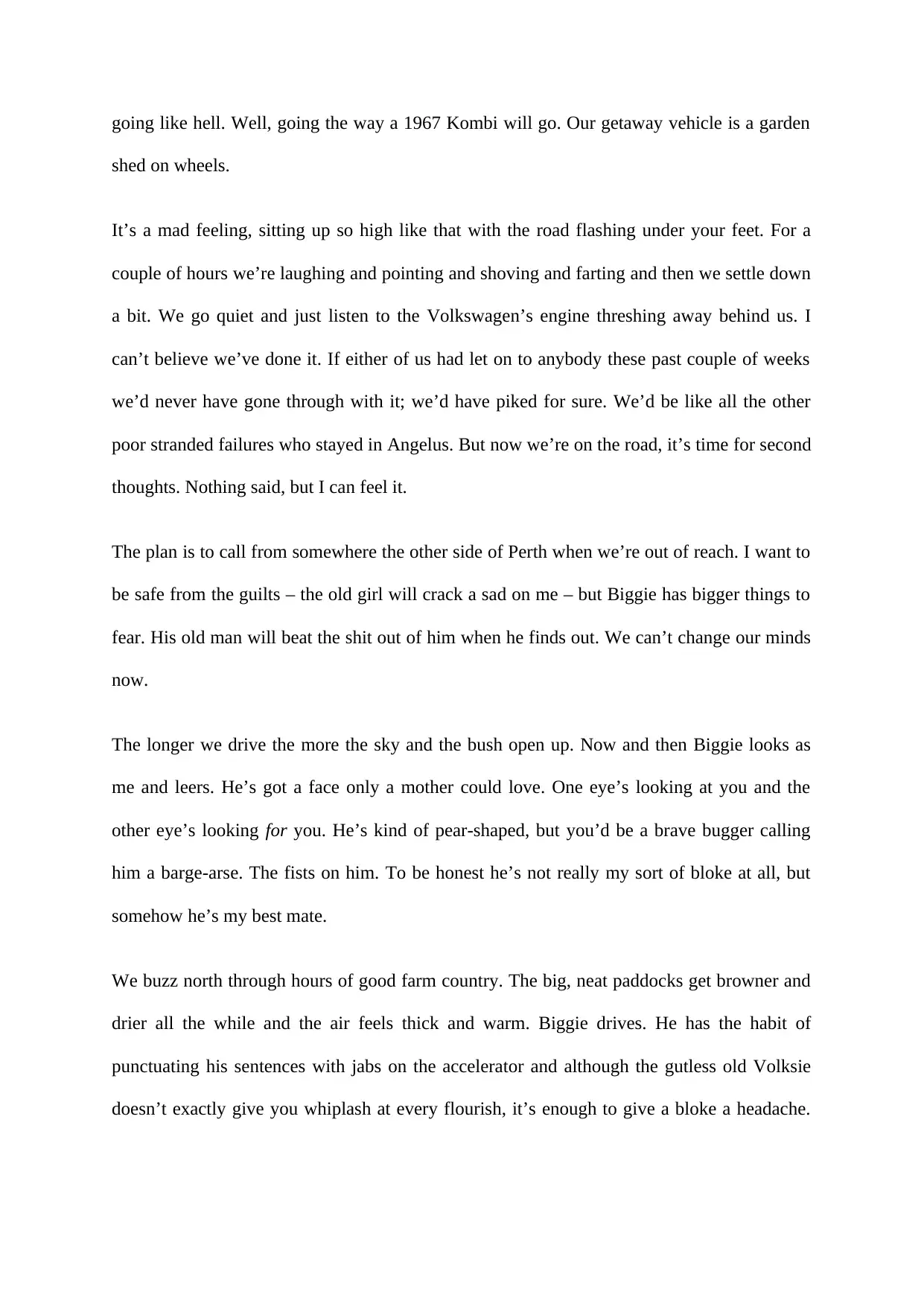
going like hell. Well, going the way a 1967 Kombi will go. Our getaway vehicle is a garden
shed on wheels.
It’s a mad feeling, sitting up so high like that with the road flashing under your feet. For a
couple of hours we’re laughing and pointing and shoving and farting and then we settle down
a bit. We go quiet and just listen to the Volkswagen’s engine threshing away behind us. I
can’t believe we’ve done it. If either of us had let on to anybody these past couple of weeks
we’d never have gone through with it; we’d have piked for sure. We’d be like all the other
poor stranded failures who stayed in Angelus. But now we’re on the road, it’s time for second
thoughts. Nothing said, but I can feel it.
The plan is to call from somewhere the other side of Perth when we’re out of reach. I want to
be safe from the guilts – the old girl will crack a sad on me – but Biggie has bigger things to
fear. His old man will beat the shit out of him when he finds out. We can’t change our minds
now.
The longer we drive the more the sky and the bush open up. Now and then Biggie looks as
me and leers. He’s got a face only a mother could love. One eye’s looking at you and the
other eye’s looking for you. He’s kind of pear-shaped, but you’d be a brave bugger calling
him a barge-arse. The fists on him. To be honest he’s not really my sort of bloke at all, but
somehow he’s my best mate.
We buzz north through hours of good farm country. The big, neat paddocks get browner and
drier all the while and the air feels thick and warm. Biggie drives. He has the habit of
punctuating his sentences with jabs on the accelerator and although the gutless old Volksie
doesn’t exactly give you whiplash at every flourish, it’s enough to give a bloke a headache.
shed on wheels.
It’s a mad feeling, sitting up so high like that with the road flashing under your feet. For a
couple of hours we’re laughing and pointing and shoving and farting and then we settle down
a bit. We go quiet and just listen to the Volkswagen’s engine threshing away behind us. I
can’t believe we’ve done it. If either of us had let on to anybody these past couple of weeks
we’d never have gone through with it; we’d have piked for sure. We’d be like all the other
poor stranded failures who stayed in Angelus. But now we’re on the road, it’s time for second
thoughts. Nothing said, but I can feel it.
The plan is to call from somewhere the other side of Perth when we’re out of reach. I want to
be safe from the guilts – the old girl will crack a sad on me – but Biggie has bigger things to
fear. His old man will beat the shit out of him when he finds out. We can’t change our minds
now.
The longer we drive the more the sky and the bush open up. Now and then Biggie looks as
me and leers. He’s got a face only a mother could love. One eye’s looking at you and the
other eye’s looking for you. He’s kind of pear-shaped, but you’d be a brave bugger calling
him a barge-arse. The fists on him. To be honest he’s not really my sort of bloke at all, but
somehow he’s my best mate.
We buzz north through hours of good farm country. The big, neat paddocks get browner and
drier all the while and the air feels thick and warm. Biggie drives. He has the habit of
punctuating his sentences with jabs on the accelerator and although the gutless old Volksie
doesn’t exactly give you whiplash at every flourish, it’s enough to give a bloke a headache.
Paraphrase This Document
Need a fresh take? Get an instant paraphrase of this document with our AI Paraphraser
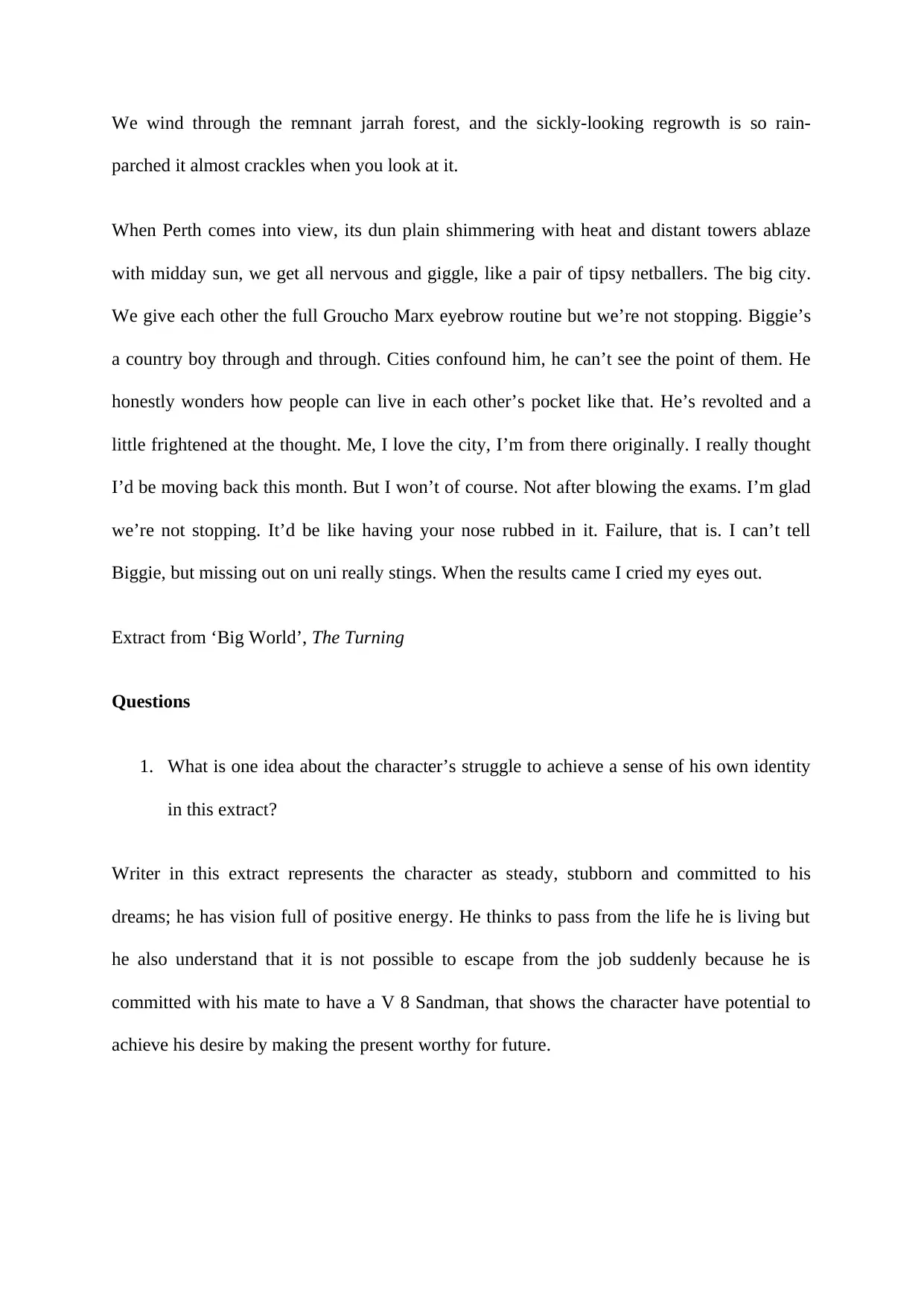
We wind through the remnant jarrah forest, and the sickly-looking regrowth is so rain-
parched it almost crackles when you look at it.
When Perth comes into view, its dun plain shimmering with heat and distant towers ablaze
with midday sun, we get all nervous and giggle, like a pair of tipsy netballers. The big city.
We give each other the full Groucho Marx eyebrow routine but we’re not stopping. Biggie’s
a country boy through and through. Cities confound him, he can’t see the point of them. He
honestly wonders how people can live in each other’s pocket like that. He’s revolted and a
little frightened at the thought. Me, I love the city, I’m from there originally. I really thought
I’d be moving back this month. But I won’t of course. Not after blowing the exams. I’m glad
we’re not stopping. It’d be like having your nose rubbed in it. Failure, that is. I can’t tell
Biggie, but missing out on uni really stings. When the results came I cried my eyes out.
Extract from ‘Big World’, The Turning
Questions
1. What is one idea about the character’s struggle to achieve a sense of his own identity
in this extract?
Writer in this extract represents the character as steady, stubborn and committed to his
dreams; he has vision full of positive energy. He thinks to pass from the life he is living but
he also understand that it is not possible to escape from the job suddenly because he is
committed with his mate to have a V 8 Sandman, that shows the character have potential to
achieve his desire by making the present worthy for future.
parched it almost crackles when you look at it.
When Perth comes into view, its dun plain shimmering with heat and distant towers ablaze
with midday sun, we get all nervous and giggle, like a pair of tipsy netballers. The big city.
We give each other the full Groucho Marx eyebrow routine but we’re not stopping. Biggie’s
a country boy through and through. Cities confound him, he can’t see the point of them. He
honestly wonders how people can live in each other’s pocket like that. He’s revolted and a
little frightened at the thought. Me, I love the city, I’m from there originally. I really thought
I’d be moving back this month. But I won’t of course. Not after blowing the exams. I’m glad
we’re not stopping. It’d be like having your nose rubbed in it. Failure, that is. I can’t tell
Biggie, but missing out on uni really stings. When the results came I cried my eyes out.
Extract from ‘Big World’, The Turning
Questions
1. What is one idea about the character’s struggle to achieve a sense of his own identity
in this extract?
Writer in this extract represents the character as steady, stubborn and committed to his
dreams; he has vision full of positive energy. He thinks to pass from the life he is living but
he also understand that it is not possible to escape from the job suddenly because he is
committed with his mate to have a V 8 Sandman, that shows the character have potential to
achieve his desire by making the present worthy for future.
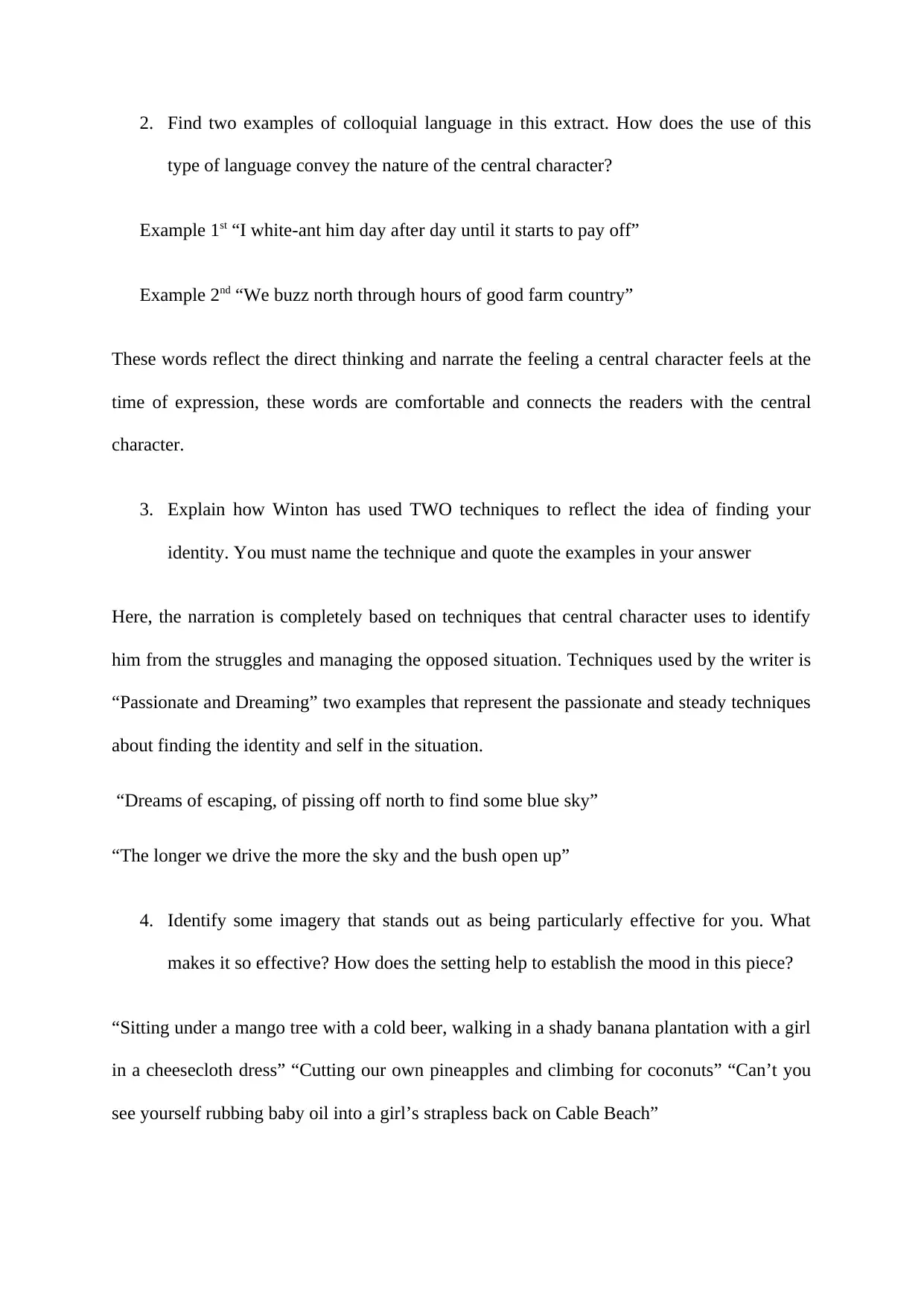
2. Find two examples of colloquial language in this extract. How does the use of this
type of language convey the nature of the central character?
Example 1st “I white-ant him day after day until it starts to pay off”
Example 2nd “We buzz north through hours of good farm country”
These words reflect the direct thinking and narrate the feeling a central character feels at the
time of expression, these words are comfortable and connects the readers with the central
character.
3. Explain how Winton has used TWO techniques to reflect the idea of finding your
identity. You must name the technique and quote the examples in your answer
Here, the narration is completely based on techniques that central character uses to identify
him from the struggles and managing the opposed situation. Techniques used by the writer is
“Passionate and Dreaming” two examples that represent the passionate and steady techniques
about finding the identity and self in the situation.
“Dreams of escaping, of pissing off north to find some blue sky”
“The longer we drive the more the sky and the bush open up”
4. Identify some imagery that stands out as being particularly effective for you. What
makes it so effective? How does the setting help to establish the mood in this piece?
“Sitting under a mango tree with a cold beer, walking in a shady banana plantation with a girl
in a cheesecloth dress” “Cutting our own pineapples and climbing for coconuts” “Can’t you
see yourself rubbing baby oil into a girl’s strapless back on Cable Beach”
type of language convey the nature of the central character?
Example 1st “I white-ant him day after day until it starts to pay off”
Example 2nd “We buzz north through hours of good farm country”
These words reflect the direct thinking and narrate the feeling a central character feels at the
time of expression, these words are comfortable and connects the readers with the central
character.
3. Explain how Winton has used TWO techniques to reflect the idea of finding your
identity. You must name the technique and quote the examples in your answer
Here, the narration is completely based on techniques that central character uses to identify
him from the struggles and managing the opposed situation. Techniques used by the writer is
“Passionate and Dreaming” two examples that represent the passionate and steady techniques
about finding the identity and self in the situation.
“Dreams of escaping, of pissing off north to find some blue sky”
“The longer we drive the more the sky and the bush open up”
4. Identify some imagery that stands out as being particularly effective for you. What
makes it so effective? How does the setting help to establish the mood in this piece?
“Sitting under a mango tree with a cold beer, walking in a shady banana plantation with a girl
in a cheesecloth dress” “Cutting our own pineapples and climbing for coconuts” “Can’t you
see yourself rubbing baby oil into a girl’s strapless back on Cable Beach”
⊘ This is a preview!⊘
Do you want full access?
Subscribe today to unlock all pages.

Trusted by 1+ million students worldwide
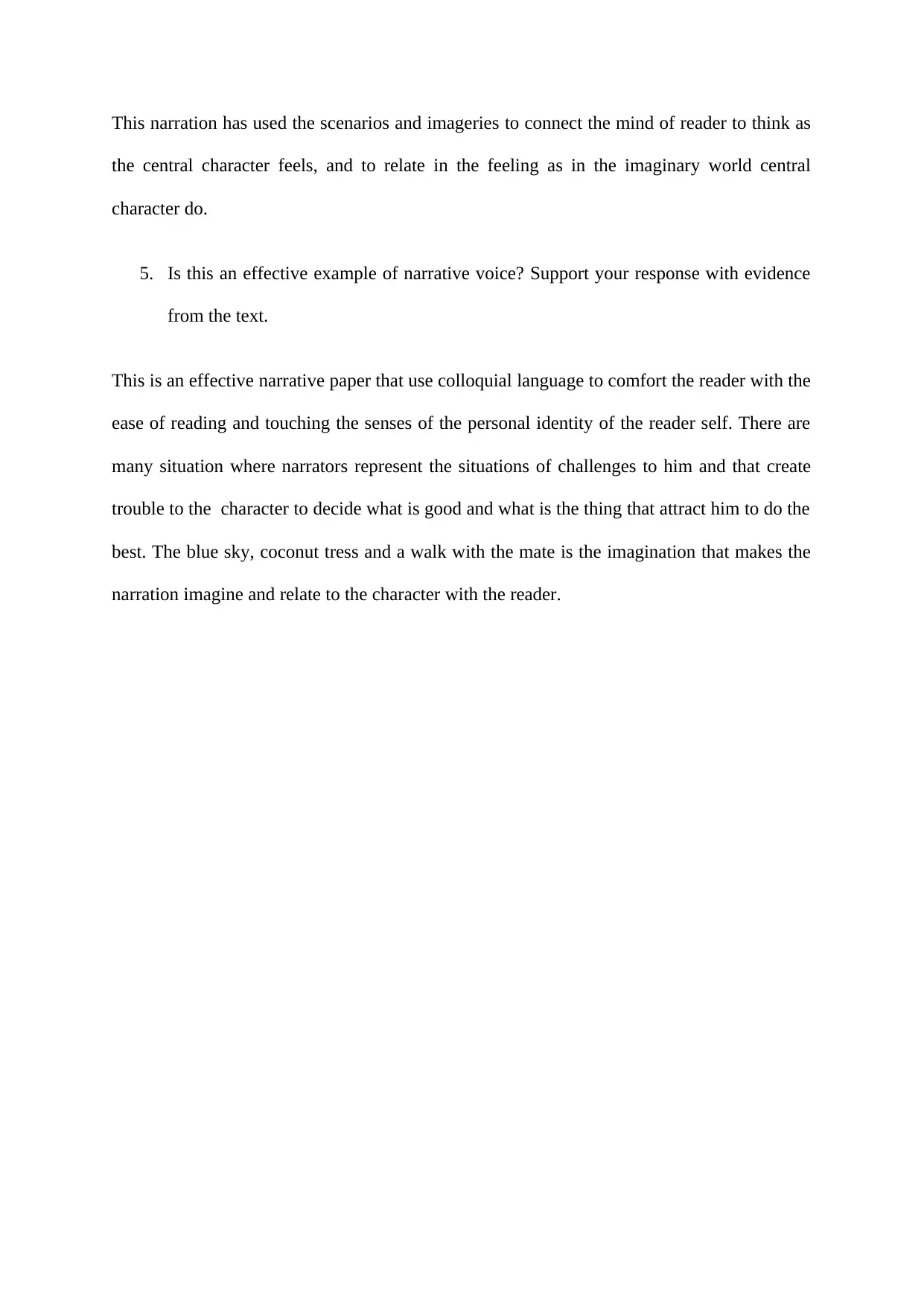
This narration has used the scenarios and imageries to connect the mind of reader to think as
the central character feels, and to relate in the feeling as in the imaginary world central
character do.
5. Is this an effective example of narrative voice? Support your response with evidence
from the text.
This is an effective narrative paper that use colloquial language to comfort the reader with the
ease of reading and touching the senses of the personal identity of the reader self. There are
many situation where narrators represent the situations of challenges to him and that create
trouble to the character to decide what is good and what is the thing that attract him to do the
best. The blue sky, coconut tress and a walk with the mate is the imagination that makes the
narration imagine and relate to the character with the reader.
the central character feels, and to relate in the feeling as in the imaginary world central
character do.
5. Is this an effective example of narrative voice? Support your response with evidence
from the text.
This is an effective narrative paper that use colloquial language to comfort the reader with the
ease of reading and touching the senses of the personal identity of the reader self. There are
many situation where narrators represent the situations of challenges to him and that create
trouble to the character to decide what is good and what is the thing that attract him to do the
best. The blue sky, coconut tress and a walk with the mate is the imagination that makes the
narration imagine and relate to the character with the reader.
1 out of 7
Your All-in-One AI-Powered Toolkit for Academic Success.
+13062052269
info@desklib.com
Available 24*7 on WhatsApp / Email
![[object Object]](/_next/static/media/star-bottom.7253800d.svg)
Unlock your academic potential
Copyright © 2020–2026 A2Z Services. All Rights Reserved. Developed and managed by ZUCOL.
